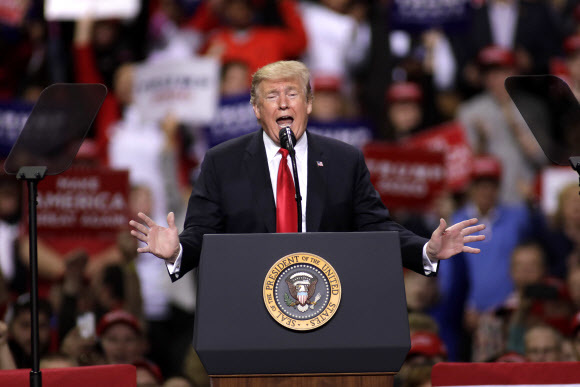 |
|
US President Donald Trump speaks at a campaign rally in Green Bay, Wisconsin, on Apr. 27. (AFP/Yonhap News)
|
Refers to SK as “very wealthy country” that can afford to pay more in campaign rally
After South Korea’s share of the cost of stationing US troops in the country surged by 8.2% this year, US President Donald Trump said he’ll will ask for yet another increase next year. During a campaign rally in Green Bay, Wisconsin, Trump contended that the US was being ripped off by the rich countries that it’s protecting. “We're defending the world, we're defending wealthy countries that can well afford to pay us,” he said. “There’s one country [. . .] we spend [US$]5 billion a year defending them. So I said to the generals, ‘How much do we spend?’ they say, ‘Sir, we spent 5 billion.’ Very wealthy country. I said, ‘How much do they pay?’ ‘Sir, they pay 500 million.’” “So I called the country, [. . .] I said, ‘It’s no good. We can’t do this anymore.’ [. . .] He said, ‘Well, we'll give you 500 million more because the budget you see had already been set.’” “So I said, ‘It’s OK. You know, I understand you have [a] budget. [. . .] I said we’re going to call you for much more [next year]. You got to pay, not fair.” “So they paid us more than 500 million for one phone call. [. . .] First call they’ve had in 35 years,” Trump said. While Trump didn’t specify which country he was talking about, he claimed during the US’ defense cost-sharing negotiations with South Korea in February that the US was spending US$5 billion on South Korea and that South Korea was only spending US$500 million. While Trump was criticized for exaggerating how much the US spends on maintaining a troop presence in South Korea and how much South Korea’s share of that cost has increased, he once again repeated those same claims. South Korea’s total share this year, per its agreement with the US, amounts to 1.04 trillion won (US$897.96 million), up 78.7 billion won (US$67.95 million, or 8.2%) from last year. While South Korea wanted the agreement to be valid for five years, as previous agreements had been, this period of validity was reduced to one year, at the US’ request. By Lee Bon-yeong, staff reporter Please direct comments or questions to [english@hani.co.kr]






